| Listing 1 - 8 of 8 |
Sort by
|
Book
ISBN: 0520023390 Year: 1973 Publisher: Berkeley [etc.] University of California Press
Abstract | Keywords | Export | Availability | Bookmark
 Loading...
Loading...Choose an application
- Reference Manager
- EndNote
- RefWorks (Direct export to RefWorks)
Sea stories, American --- Whales in literature --- Whaling in literature --- History and criticism --- Melville, Herman, --- Melville, Herman
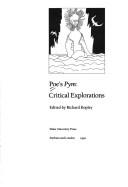
ISBN: 0822312352 0822312468 0822397609 1322101426 Year: 1992 Publisher: Durham Duke university press
Abstract | Keywords | Export | Availability | Bookmark
 Loading...
Loading...Choose an application
- Reference Manager
- EndNote
- RefWorks (Direct export to RefWorks)
Sea stories, American --- Whaling in literature --- History and criticism --- Poe, Edgar Allan,
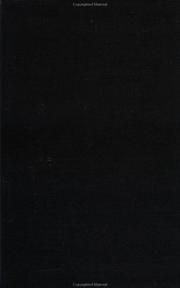
ISBN: 081533303X Year: 1998 Publisher: New York (N.Y.): Garland
Abstract | Keywords | Export | Availability | Bookmark
 Loading...
Loading...Choose an application
- Reference Manager
- EndNote
- RefWorks (Direct export to RefWorks)
Sea stories, American --- Whaling in literature --- History and criticism --- Poe, Edgar Allan, --- Criticism and interpretation --- History.
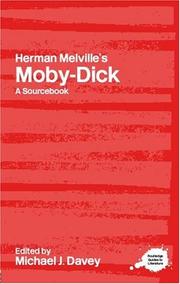
ISBN: 0415247705 0415247713 Year: 2004 Publisher: London Routledge
Abstract | Keywords | Export | Availability | Bookmark
 Loading...
Loading...Choose an application
- Reference Manager
- EndNote
- RefWorks (Direct export to RefWorks)
Melville, Herman --- Psychological fiction, American --- Sea stories, American --- Whales in literature --- Whaling in literature --- History and criticism --- Melville, Herman,
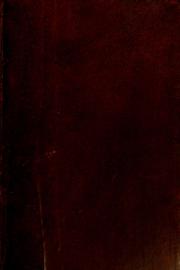
ISBN: 087352490X Year: 1985 Publisher: New York Modern Language Association of America
Abstract | Keywords | Export | Availability | Bookmark
 Loading...
Loading...Choose an application
- Reference Manager
- EndNote
- RefWorks (Direct export to RefWorks)
Sea stories, American --- Whales in literature --- Whaling in literature --- History and criticism --- Study and teaching --- Melville, Herman, --- Study and teaching.
Book
ISBN: 2719304417 Year: 1975 Publisher: Paris Mouton
Abstract | Keywords | Export | Availability | Bookmark
 Loading...
Loading...Choose an application
- Reference Manager
- EndNote
- RefWorks (Direct export to RefWorks)
Melville, Herman --- Sea stories, American --- Whaling in literature. --- Whales in literature. --- History and criticism. --- Melville, Herman, --- -Whales in literature --- Whaling in literature --- American sea stories --- American fiction --- History and criticism --- Whales in literature --- Melville, Herman (1819-1891) --- Melville, Herman (1819-1891). Moby Dick --- Critique et interprétation --- Critique et interprétation
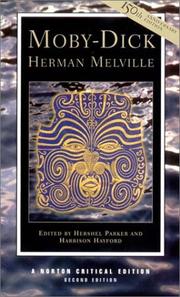
ISBN: 0393972836 9780393972832 Year: 2002 Volume: *3 Publisher: New York London Norton
Abstract | Keywords | Export | Availability | Bookmark
 Loading...
Loading...Choose an application
- Reference Manager
- EndNote
- RefWorks (Direct export to RefWorks)
"Moby Dick (1851) is an epic tale of the conflict between man and his fate. Captain Ahab's obsessive quest to destroy the great white whale that tore off his leg leads the Pequod and its crew to disaster. Melville's extraordinary narrative defies c1assification: it teems with ideas and imagery and the passion of its author."--Jacket. "For this Sesquicentennial Norton Critical Edition, the Northwestern-Newberry text of Moby-Dick has been generously footnoted to include dozens of biographical discoveries, mainly from Hershel Parker's work on his two-volume biography of Melville. A section of "Whaling and Whalecraft" features prose and graphics by John B. Putnam, a sample of contemporary whaling engravings, as well as, new to this edition, an engraving of Tupai Cupa, the real-life inspiration for the character of Queequeg. Evoking Melville's fascination with the fluidity of categories like savagery and civilization, the image of Tupai Cupa fittingly introduces "Before Moby-Dick: International Controversy over Melville," a new section that documents the ferocity of religions, political, and sexual hostility toward Melville in reaction to his early books, beginning with Typee in 1846. The image of Tupai Cupa also evokes Melville's interest in the mystery of self-identity and the possibility of knowing another person s "queenly personality" (Chapter 119). That theme (focused on Melville, Ishmael, and Ahab) is pursued in "A Handful of Critical Challenges," from Walter E. Bezanson's classic centennial study through Harrison Hayford's meditation on "Loomings" and recent essays by Camille Paglia and John Wenke. In "Reviews and Letters by Melville," a letter has been redated and a wealth of new biographical material has been added to the footnotes, notably to Melville's "Hawthorne and His Mosses." "Analogues and Sources" retains classic pieces by J.N. Reynolds and Owen Chase, as well as new findings by Geoffrey Sanborn and Steven Olsen-Smith. In "Reviews of Moby-Dick" emphasizes the ongoing religious hostility toward Melville and highlights new discoveries, such as the first-known Scottish review of The Whale. "Posthumous Praise and the Melville Revival: 1893-1927" collects belated, enthusiastic praise up through that of William Faulkner. "Biographical Cross-Light" is Hershel Parker's somber look at wha t writing Moby-Dick cost Melville and his family."--Publisher's website.
American literature --- Ahab [Capitaine] (Personnage littéraire) --- Ahab [Captain] (Fictitious character) --- Ahab [Kapitein] (Literair personage) --- Whaling in literature --- Melville, Herman --- Ahab, Captain (Fictitious character) --- Whaling ships --- Ship captains --- Mentally ill --- Whaling --- Whales --- Melville, Herman,
Book
ISBN: 9781517907549 1517907543 9781517907556 1517907551 Year: 2022 Publisher: Minneapolis : University of Minnesota Press,
Abstract | Keywords | Export | Availability | Bookmark
 Loading...
Loading...Choose an application
- Reference Manager
- EndNote
- RefWorks (Direct export to RefWorks)
For years critics have viewed Herman Melville's Captain Ahab as the paradigm of a strong, controlling agent. Farmer and Schroeder's volume aims to rethink Ahab through a series of "materialist" frames, including posthumanism, disability studies, affect theory, animal studies, environmental humanities, systems theory, and oceanic studies. The essays here recast Ahab as a contingent figure, transformed by his environment--by chemistry, electromagnetism, entomology, meteorology, diet, illness, pain, trauma, and neurons firing--in ways that unexpectedly force us to see him as worthy of our empathy and our compassion. Collectively these materialist readings challenge our ways of thinking about the boundaries of both persons and actions, along with the racist and environmental violence caused by 'personhood' and by the 'human.
Sea stories, American --- Ahab, Captain (Fictitious character) --- Materialism in literature --- Whaling in literature --- Sailors in literature --- Captain Ahab (Fictitious character) --- History and criticism --- Melville, Herman, --- Melville, Herman --- Melvill, German --- Melville, Hermann --- Meville, Herman --- Melvil, Cherman --- Mai-erh-wei-erh, Ho-erh-man --- Melṿil, Herman --- Tarnmoor, Salvator R. --- מלוויל, הרמן, --- מלויל, הרמן, --- ميلڤيل، هرمن، --- 麥爾維爾, --- Virginian spending July in Vermont, --- Melvill, Herman, --- Characters --- Captain Ahab. --- Matérialisme --- Marins. --- Baleines --- Chasse --- Ahab --- Seamen in literature
| Listing 1 - 8 of 8 |
Sort by
|

 Search
Search Feedback
Feedback About UniCat
About UniCat  Help
Help News
News